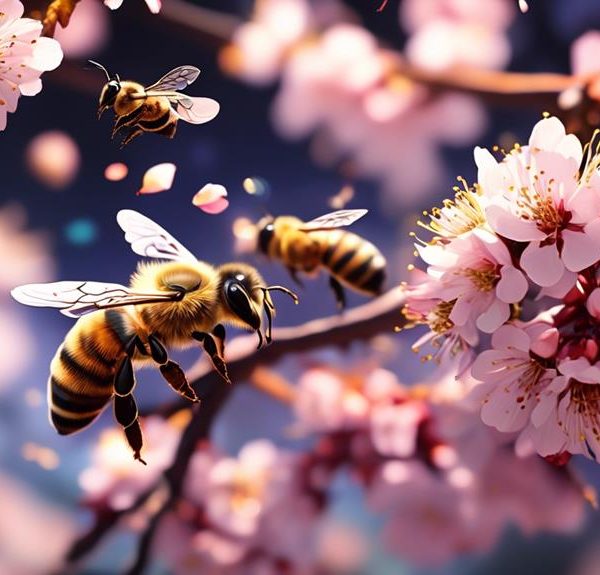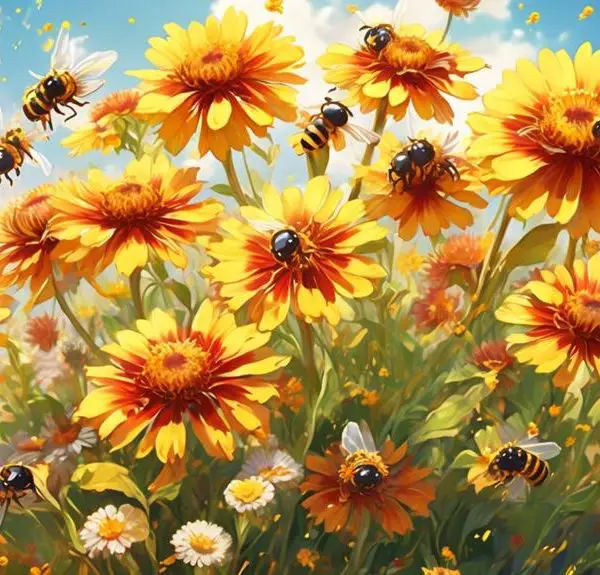Marvel at the unique allure blackberry bushes hold for bees and learn why this relationship matters in our intriguing exploration.
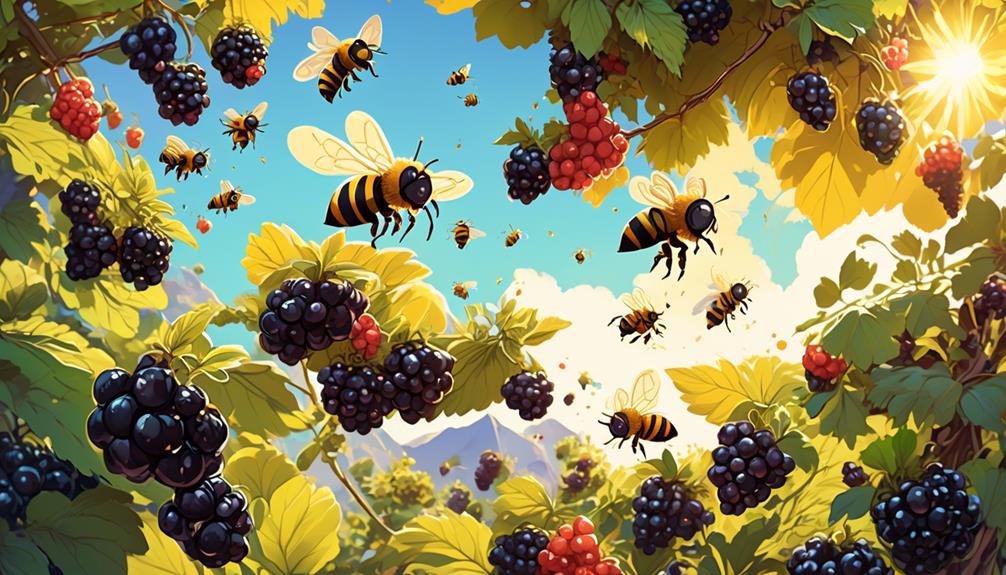
Do Bees Like Blackberry Bushes
You might think that all flowers and plants are the same to bees, but that's not entirely true. Bees actually have certain preferences when it comes to the types of flowers they visit for nectar and pollen, and blackberry bushes are high on their list.
They're attracted to the bushes' large clusters of small white flowers, which bloom in late spring to early summer – a crucial period in the bees' foraging calendar. But why do blackberry bushes hold such a special allure for bees? Is it the fragrance, the color, or perhaps something more subtle?
As you explore further, you'll discover the intriguing relationship between bees and blackberry bushes, and why it matters.
Key Takeaways
- Bees are attracted to blackberry bushes due to their abundant nectar and pollen.
- Blackberry bushes provide high-quality nectar rich in sugars, which is essential for bee energy.
- The bright white flowers and enticing scent of blackberry bushes attract bees visually and olfactorily.
- Blackberry bushes play a crucial role in beekeeping by boosting honey production and supporting bee health and longevity.
Understanding Bees and Their Preferences
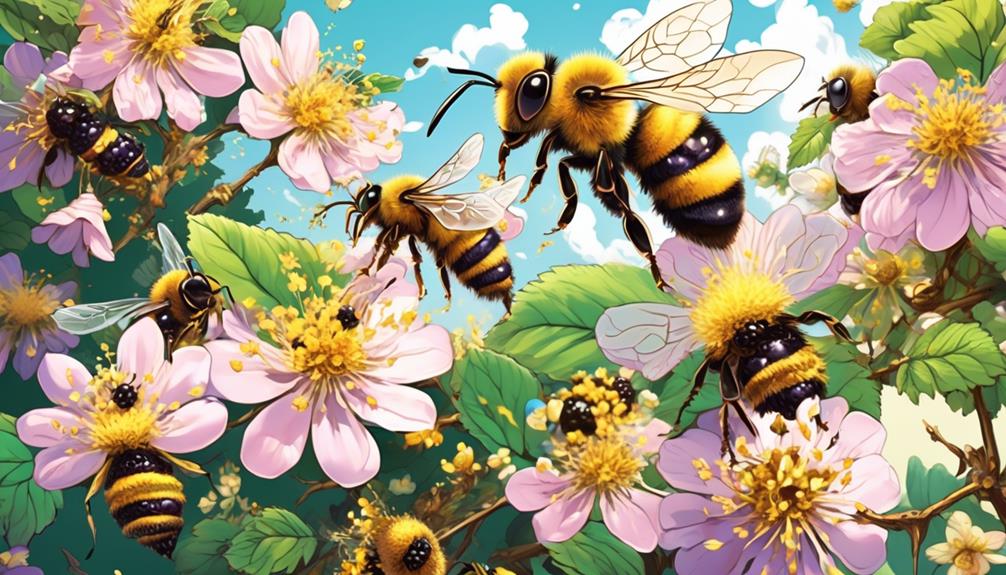
To truly appreciate why bees might favor blackberry bushes, it's crucial to delve into their unique preferences and behaviors. You see, bees aren't just simple insects; they've complex needs and habits that influence their choices.
Bees are particularly drawn to plants with abundant nectar and pollen, which are critical for their survival. They need these resources to produce honey and feed their colonies. Now, imagine you're a bee. You're seeking nourishment, and you encounter a blackberry bush. It's a veritable buffet, offering copious amounts of nectar and pollen. It's not just about the quantity, though; quality matters too. Blackberry nectar is rich in sugars, providing the energy bees need to keep buzzing.
Additionally, bees are visual creatures. They're attracted to bright, contrasting colors. Blackberry bushes, with their striking green leaves and deep purple berries, are visually appealing to bees. Then there's the aroma. Blackberries have a sweet, enticing scent that can draw bees from far and wide.
Understanding bees' preferences helps clarify why they might be especially attracted to blackberry bushes. As you delve deeper into this topic, you'll find the natural world is full of fascinating relationships like this.
The Attraction of Blackberry Bushes
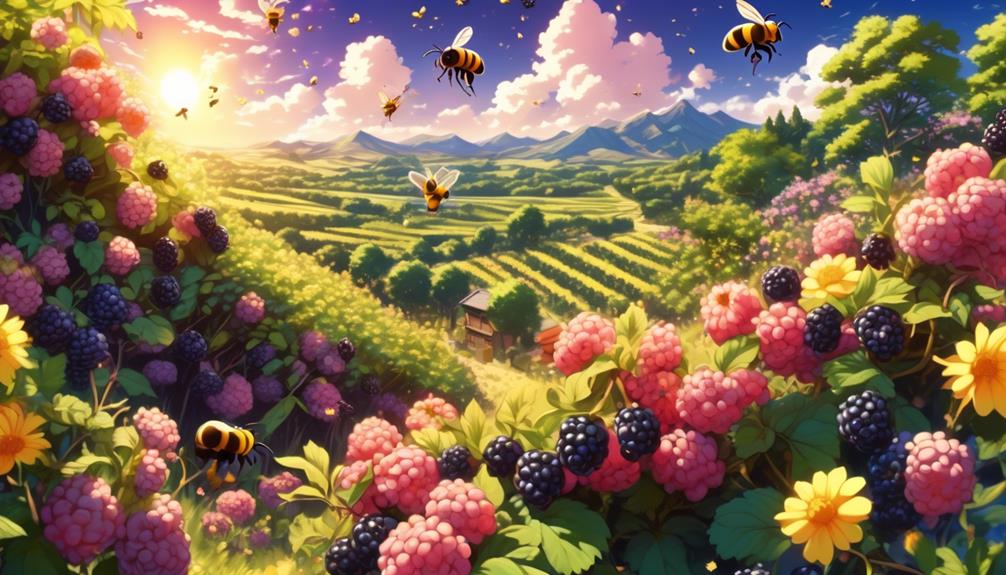
Now that we've explored the preferences of bees, let's zero in on the allure of blackberry bushes and why these prickly plants are such crowd-pleasers in the bee world. Blackberry bushes aren't just attractive to bees because of their bright, fragrant blooms; they also offer a rich source of nectar and pollen which are vital for a bee's survival.
Consider this table below which delves into why bees are attracted to blackberry bushes:
Aspect | Blackberry Bushes | Bees' Perspective |
|---|---|---|
Color | Bright white or pink blooms | Bees can easily spot these colors from a distance |
Fragrance | Sweet, enticing scent | The smell guides bees directly to the nectar |
Nutrition | High pollen and nectar content | Bees need these for sustenance and honey production |
Nutritional Benefits for Bees
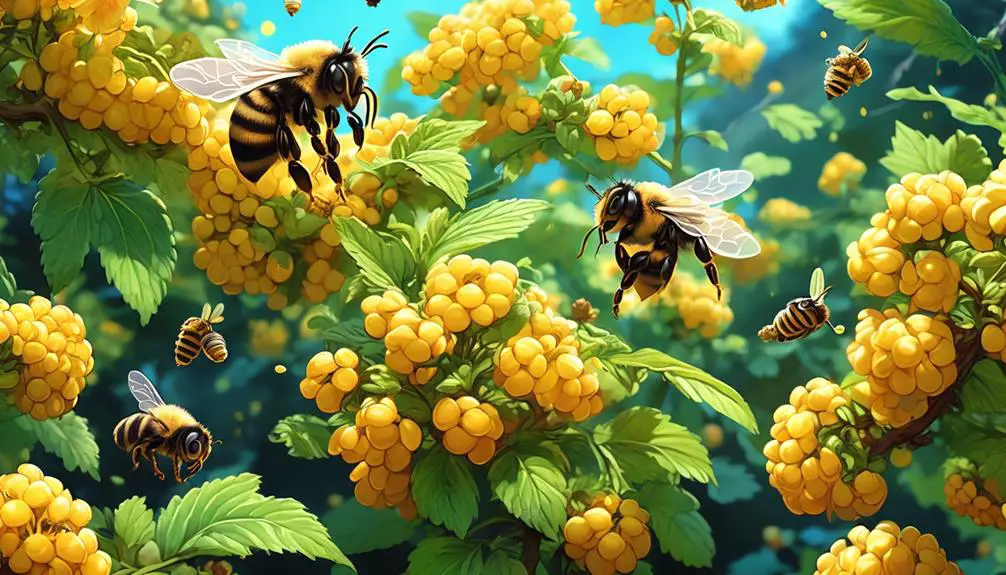
Delving into the nutritional benefits, you'll find that blackberry bushes are a veritable feast for bees, providing a bounty of nectar and pollen, essential elements for their survival and honey production. While bees usually gather nectar from a variety of plants, blackberry bushes offer an impressive concentration of sugars, especially fructose, glucose, and sucrose. This rich energy source fuels their daily activities and forms the base for their honey-making process.
Additionally, the pollen collected from blackberry flowers is a critical protein source for bees. It's packed with amino acids, vitamins, and lipids, necessary for their growth and development. Notably, blackberry pollen has a high protein content, making it highly desirable for bees, especially during the breeding season when the demand for protein is at its peak.
But that's not all. Blackberry bushes also bloom for an extended period, providing bees with a reliable and continuous food source. This availability is crucial, particularly in early spring and late summer when other nectar sources may be scarce.
Role of Blackberry Bushes in Beekeeping
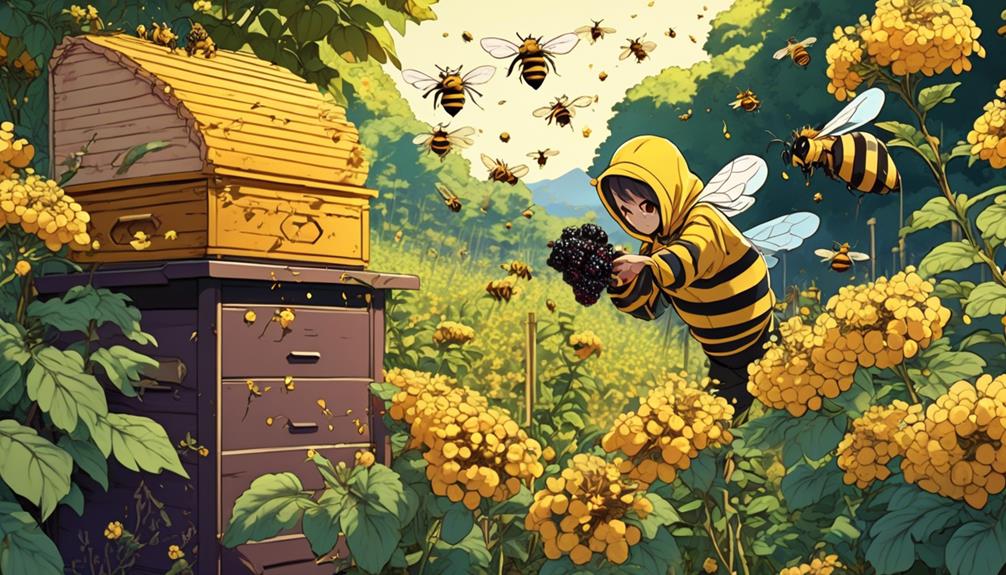
In the world of beekeeping, blackberry bushes play a pivotal role, offering a consistent and nutrient-packed food source that can significantly boost honey production. They're not just a seasonal treat, but a vital part of a balanced bee diet. With their deep nectar wells and pollen-rich stamens, blackberry flowers are a bee's paradise, attracting swarms from miles around.
To highlight the benefits of blackberry bushes in beekeeping, consider the following:
Benefit | Description | Impact on Bees |
|---|---|---|
Nutrient-rich | Blackberry blooms are packed with nectar and pollen. | Supports bee health and longevity. |
Consistent supply | Blackberries bloom over several weeks. | Ensures continuous food source. |
Boosts honey production | The nectar from blackberries is perfect for honey. | Increases honey yield. |
Attracts more bees | The scent of blackberries is irresistible to bees. | Helps in bee population growth. |
You'll see that blackberry bushes aren't just beneficial, they're essential. They help in maintaining your bee population, boosting honey production, and ensuring the overall health of your hive. As a beekeeper, incorporating blackberries into your strategy isn't just smart, it's vital for your success.
Cultivating Bee-Friendly Gardens
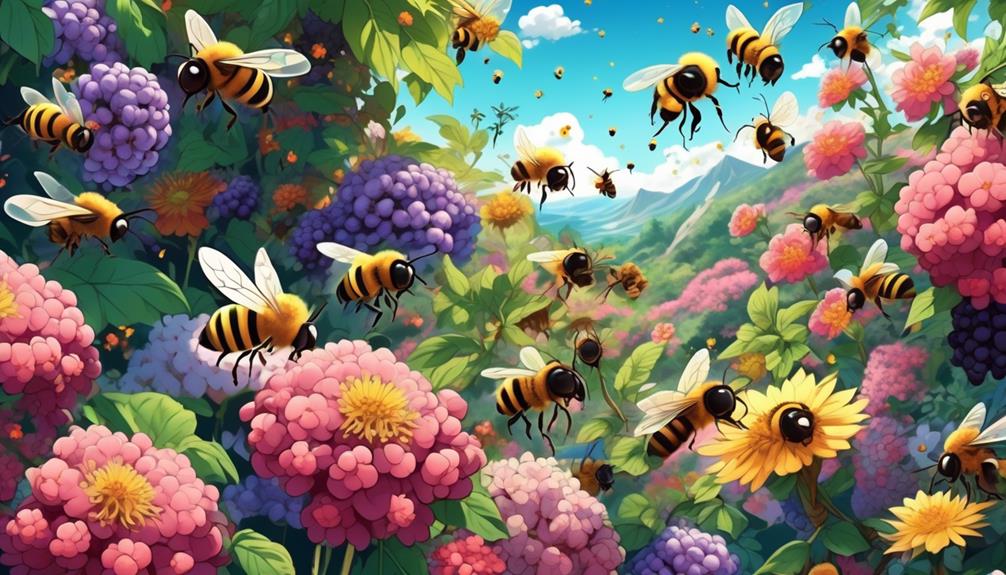
To foster a thriving bee population and enhance your honey yield, you'll want to consider cultivating a bee-friendly garden, with a particular focus on planting blackberry bushes. This isn't just because bees adore the nectar from blackberry flowers but also because these bushes are low maintenance and highly productive.
Start by selecting a sunny location as blackberry bushes thrive in full sun. Keep in mind that good drainage is critical. You don't want sitting water around the roots. When planting, space the bushes about 4 to 10 feet apart to allow room for growth.
Think about the bees' needs too. They prefer a diverse food source, so incorporate a variety of plants that bloom at different times of the year to provide a continuous food supply. Also, consider adding a small water feature. A bird bath or a shallow dish with rocks for the bees to land on will do the trick.
Frequently Asked Questions
What Other Plants Are Bees Commonly Attracted to Besides Blackberry Bushes?
You're curious about the diverse palette of plants bees are attracted to, aren't you?
Well, aside from blackberry bushes, bees love a wide variety. They're particularly fond of lavender, with its vibrant purple flowers and enticing scent.
Sunflowers, too, are a big hit, their large, bright heads offering abundant nectar.
Also, don't forget the humble dandelion; a garden pest to some, but a bee's delight.
And let's not overlook clovers, a bee's picnic indeed!
How Can I Prevent Bees From Stinging Me While I'm Gardening?
While you're gardening, it's wise to take certain precautions to avoid bee stings.
- Avoid wearing bright colors or floral prints, which can attract bees.
- Don't wear perfume or scented lotions, as these can also attract them.
- Be careful with your movements; abrupt actions can provoke bees.
- If a bee comes near you, stay calm and slowly move away.
- Always wear gardening gloves to protect your hands.
- Consider wearing a hat with a net to protect your face from bee encounters.
Lastly, if you're allergic to bee stings, it's important to keep your EpiPen nearby for immediate treatment in case of an emergency.
Are There Any Specific Species of Bees That Are More Attracted to Blackberry Bushes?
Yes, there are specific species of bees that are more attracted to blackberry bushes. Honey bees, bumblebees, and mason bees are particularly fond of them.
The nectar and pollen from the blackberry flowers provide a rich food source for these bees. You'll often see them buzzing around your blackberry bushes, especially during the flowering season.
Can Bees Help in the Propagation of Blackberry Bushes?
Yes, bees can definitely help propagate blackberry bushes. When you see bees buzzing around these bushes, they're busy doing important work. They're collecting nectar and pollen, and in the process, they're cross-pollinating the flowers.
This cross-pollination is crucial for the development of the blackberry fruit. So, not only do bees enjoy blackberry bushes, but the bushes also greatly benefit from the bees' visits.
What Are the Potential Negative Impacts of Bees on Blackberry Bushes?
You might think bees are all good for plants, but they can have negative impacts too.
For instance, bees can spread diseases from one blackberry bush to another while foraging for nectar.
They're also known to favor certain plants, neglecting others and affecting their pollination.
And let's not forget those pesky honeydew-producing insects they can inadvertently introduce, leading to sooty mold growth.
Conclusion
So, you've learned that bees indeed have a soft spot for blackberry bushes. They offer an alluring mix of nectar and pollen, providing essential nutrition.
Not only do they play a significant role in beekeeping, but they also help cultivate bee-friendly gardens. So why not consider adding some blackberry bushes to your yard?
You'll be supporting these vital pollinators and might even reap a few sweet blackberries in the process.

